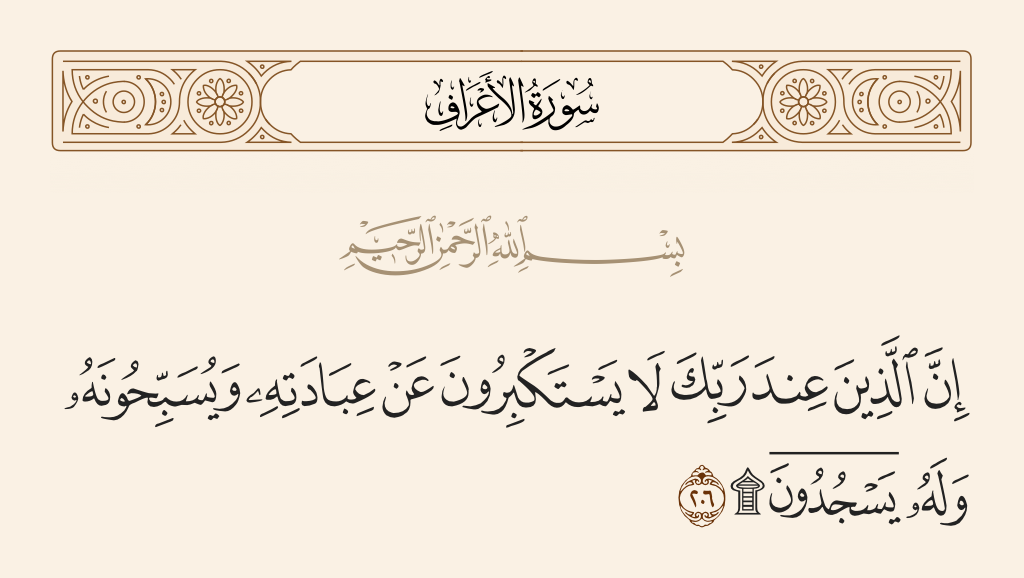Surat Al-A‘raf Verse No. 206: Reading and listening
Translation of the verse 206 from Surah Al-A‘raf : Number of verses 206 - - page 176 - Part 9.

﴾إِنَّ ٱلَّذِينَ عِندَ رَبِّكَ لَا يَسۡتَكۡبِرُونَ عَنۡ عِبَادَتِهِۦ وَيُسَبِّحُونَهُۥ وَلَهُۥ يَسۡجُدُونَۤ۩ ﴿
[ الأعراف: 206]
Surely, those who are with your Lord (angels) are never too proud to perform acts of worship to Him, but they glorify His Praise and prostrate before Him.
English - Sahih International
Indeed, those who are near your Lord are not prevented by arrogance from His worship, and they exalt Him, and to Him they prostrate.
Tafheem-ul-Quran by Syed Abu-al-A'la Maududi
(7:206) [The angels] who are near to Your Lord, never turn away irom His service out of arrogance; *155 they rather glorify Him *156 and prostrate themselves before Him. *157
Tafheem-ul-Quran by Syed Abu-al-A'la Maududi
*155). It is Satan who behaves arrogantly and disdains to worship God, and such an attitude naturally brings about degradation and abasement. But an attitude marked by consistent surrender to God characterizes angels and leads people to spiritual elevation and proximity to God. Those interested in attaining this state should emulate the angels and refrain from following the ways of Satan.
*156). To celebrate God's praise signifies that the angels acknowledge and constantly affirm that God is beyond any flaw, free from every defect, error and weakness; that He has no partner or peer; that none is like Him.
*157). Whoever recites or hears this verse should fall in prostration so as to emulate the practice of angels. In addition. prostration also proves that one has no shred of pride, nor is one averse to the duty of being subservient to God.
In all, there are fourteen verses in the Qur'an the recitation of which requires one to prostrate. That one should prostrate on reading or hearing these verses is, in principle, an incontrovertible point. There is, however, some disagreement about it being obligatory (wajib). Abu Hanifah regards it as obligatory, while other authorities consider it to be recommended (Ibn Qudamah, Al-Mughni, vol. 1. p. 663; Al-Jaziri, Kitab al-Fiqh 'ala al Madhahib al-arba'ah, vol. 1. p. 464 - Ed.) According to traditions, while reciting the Qur'an in large gatherings, when the Prophet (peace be on him) came upon a verse the recitation of which calls for prostration, he prostrated, and the whole gathering followed suit. The traditions mention that sometimes some people did not have room to prostrate. Such people prostrated on the backs of others. (See Bukhari, Abwab sujud al-Quran 'Bab Izdiham al-Nas Idh'a qara'a al-Imam al-Sajdah'- Ed.) It is reported in connection with the conquest of Makka that in the course of the Qur'an-recitation, as the Prophet (peace be on him) read such a verse, those standing fell into prostration while those who were mounted on horses and camels performed prostration in that very state. It is also on record that while delivering a sermon from the pulpit the Prophet (peace be on him) came down from the pulpit to offer prostration, and resumed his sermon thereafter. (Abu da'ud, Kitab al-Salah, 'Bab al-Sujud fi Sad' - Ed.)
It is generally, believed that the conditions for this kind of prostration are exactly the same as required for offering Prayer - that one should be in a state of ritual purity, that one should be facing the Ka'bah, and that the prostration should be performed as in the state of Prayer. However, the traditions we have been able to find in the relevant sections of the Hadith collection do not specifically mention these conditions. It thus appears that one may perform prostration, irrespective of whether one fulfils these conditions or not. This view is corroborated by the practice of some of the early authorities. Bukhari, for instance, reports about 'Abd Allah b. 'Urnar that he used to perform prostration even though he would have required ablution if he wanted to perform Prayer. (See Bukhari, Abwab Sujud al-Quran, 'Bab Sujud al-Muslimin ma' al-Mushrikin'- Ed.) Likewise, it has been mentioned in Fath al-Bari about 'Abd al-Rahman al-Sulami that if he was reciting the Qur'an while moving, and he recited a verse calling for prostration, he would simply bow his head (rather than make full prostration). And he would do that even when he was required to make ablution for Prayer, and regardless of whether he was facing the Ka'bah or not.
In our view, therefore, while it is preferable to follow the general opinion of the scholars on the question, it would not be blameworthy if someone deviates from that opinion. The reason for this is that the general opinion of the scholars on this question is not supported by well-established Sunnah, and there are instances of deviation from it on the part of the early authorities.